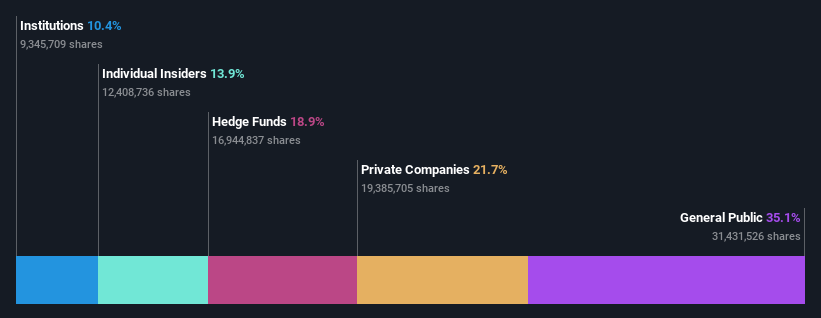Individual investors among Akumin Inc.'s (TSE:AKU) largest shareholders, saw gain in holdings value after stock jumped 36% last week
A look at the shareholders of Akumin Inc. (TSE:AKU) can tell us which group is most powerful. And the group that holds the biggest piece of the pie are individual investors with 35% ownership. Put another way, the group faces the maximum upside potential (or downside risk).
As a result, individual investors collectively scored the highest last week as the company hit CA$144m market cap following a 36% gain in the stock.
Let's take a closer look to see what the different types of shareholders can tell us about Akumin.
View our latest analysis for Akumin
What Does The Institutional Ownership Tell Us About Akumin?
Institutions typically measure themselves against a benchmark when reporting to their own investors, so they often become more enthusiastic about a stock once it's included in a major index. We would expect most companies to have some institutions on the register, especially if they are growing.
We can see that Akumin does have institutional investors; and they hold a good portion of the company's stock. This implies the analysts working for those institutions have looked at the stock and they like it. But just like anyone else, they could be wrong. If multiple institutions change their view on a stock at the same time, you could see the share price drop fast. It's therefore worth looking at Akumin's earnings history below. Of course, the future is what really matters.
Our data indicates that hedge funds own 19% of Akumin. That catches my attention because hedge funds sometimes try to influence management, or bring about changes that will create near term value for shareholders. Tahoe Investment Group Co., Ltd. is currently the largest shareholder, with 16% of shares outstanding. For context, the second largest shareholder holds about 13% of the shares outstanding, followed by an ownership of 6.2% by the third-largest shareholder. Additionally, the company's CEO Riadh Zine-El-Abidine directly holds 5.2% of the total shares outstanding.
We also observed that the top 6 shareholders account for more than half of the share register, with a few smaller shareholders to balance the interests of the larger ones to a certain extent.
While studying institutional ownership for a company can add value to your research, it is also a good practice to research analyst recommendations to get a deeper understand of a stock's expected performance. There is some analyst coverage of the stock, but it could still become more well known, with time.
Insider Ownership Of Akumin
While the precise definition of an insider can be subjective, almost everyone considers board members to be insiders. Management ultimately answers to the board. However, it is not uncommon for managers to be executive board members, especially if they are a founder or the CEO.
I generally consider insider ownership to be a good thing. However, on some occasions it makes it more difficult for other shareholders to hold the board accountable for decisions.
Our most recent data indicates that insiders own a reasonable proportion of Akumin Inc.. It has a market capitalization of just CA$144m, and insiders have CA$20m worth of shares in their own names. It is great to see insiders so invested in the business. It might be worth checking if those insiders have been buying recently.
General Public Ownership
The general public-- including retail investors -- own 35% stake in the company, and hence can't easily be ignored. This size of ownership, while considerable, may not be enough to change company policy if the decision is not in sync with other large shareholders.
Private Company Ownership
We can see that Private Companies own 22%, of the shares on issue. Private companies may be related parties. Sometimes insiders have an interest in a public company through a holding in a private company, rather than in their own capacity as an individual. While it's hard to draw any broad stroke conclusions, it is worth noting as an area for further research.
Next Steps:
It's always worth thinking about the different groups who own shares in a company. But to understand Akumin better, we need to consider many other factors. Case in point: We've spotted 2 warning signs for Akumin you should be aware of, and 1 of them doesn't sit too well with us.
If you are like me, you may want to think about whether this company will grow or shrink. Luckily, you can check this free report showing analyst forecasts for its future.
NB: Figures in this article are calculated using data from the last twelve months, which refer to the 12-month period ending on the last date of the month the financial statement is dated. This may not be consistent with full year annual report figures.
Have feedback on this article? Concerned about the content? Get in touch with us directly. Alternatively, email editorial-team (at) simplywallst.com.
This article by Simply Wall St is general in nature. We provide commentary based on historical data and analyst forecasts only using an unbiased methodology and our articles are not intended to be financial advice. It does not constitute a recommendation to buy or sell any stock, and does not take account of your objectives, or your financial situation. We aim to bring you long-term focused analysis driven by fundamental data. Note that our analysis may not factor in the latest price-sensitive company announcements or qualitative material. Simply Wall St has no position in any stocks mentioned.
Join A Paid User Research Session
You’ll receive a US$30 Amazon Gift card for 1 hour of your time while helping us build better investing tools for the individual investors like yourself. Sign up here

 Yahoo Finance
Yahoo Finance 

